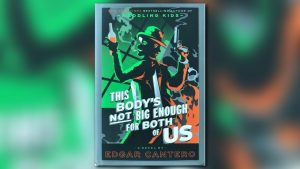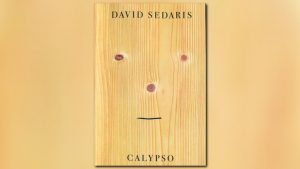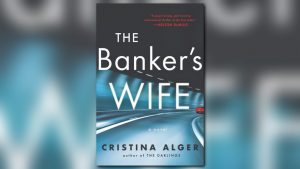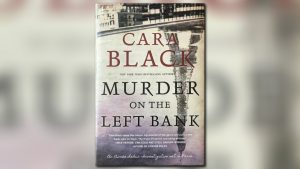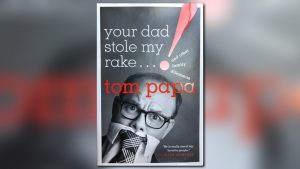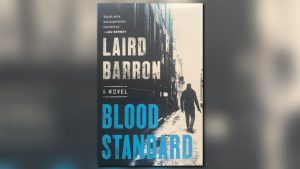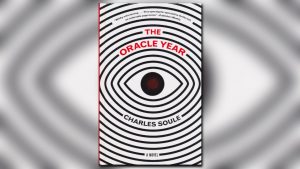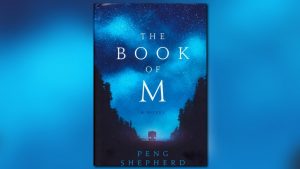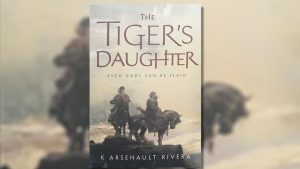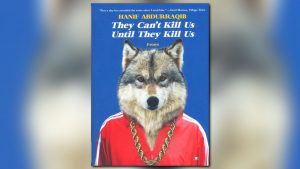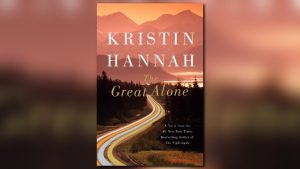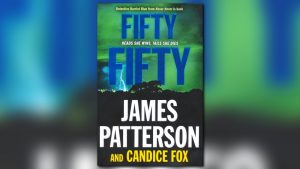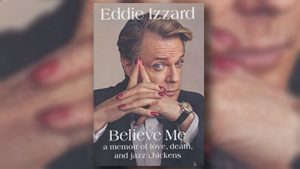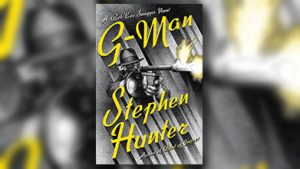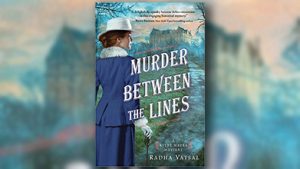Alberto Rios sat down with former U.S. Supreme Court Justice Sandra Day O’Connor to talk about her new book, Out of Order: Stories from the History of the Supreme Court
The book embarks on the history and evolution of the highest court in the United States. From the early days of judges serving in circuit and having to find their own transportation, to recent times.
Out of Order sheds light on the changes and upheaval that transformed the Supreme Court from its earliest beginnings to the institution that thrives today.
Out of Order allows the reader to see the Supreme Court’s inner workings, the personal relationships that exist among the Justices, and the customs and traditions throughout history.
It reveals the turning points and pivotal moments that have helped define the United States from the important court decisions.
Justice O’Connor takes the reader on a personal exploration, painting vivid pictures of justices in history and shows the personal side of the Supreme Court.
During the interview, O’Connor spoke about iCivics, the free website she started to get U.S. citizens more informed about their government and how it works.
“We have all these things called iPad, iPad iPod. All that stuff. So I wanted to start a website about civics. And I thought well let’s call it iCivics. And it works. It’s been a catchy way to refer to it,” O’Connor said.
NARRATOR: "Books & Co." is made possible by the Virginia G. piper center for creative writing. Serving writers and readers in the Phoenix metropolitan area, the state of Arizona, and the world.
ALBERTO RIOS: Welcome to "Books & Co.." Bienvenido todos. I'm your host, Alberto Rios. We're joined today by former justice of the Supreme Court, Sandra Day O'Connor. A fellow Arizonan who will be talking about her newest book, "Out of Order: Stories from the History of the Supreme Court." Published by Random House. Welcome, Justice O'Connor.
SANDRA DAY O'CONNOR: Thank you. I'm glad to be here.
ALBERTO RIOS: This is a fine day. I think being able to talk in some sense behind the scenes, I know this is not a tell-all book.
SANDRA DAY O'CONNOR: Oh, no.
ALBERTO RIOS: And you are very careful to say that. But I think it is a tell some interesting things kind of book.
SANDRA DAY O'CONNOR: There's some fascinating stories about the court. It goes back a lot of years. Most people, including justices of the court, don't know that much about the court's early history. And it is fun to explore it.
ALBERTO RIOS: It's more than fun, it's sometimes shocking. In very plain human ways.
SANDRA DAY O'CONNOR: Yes.
ALBERTO RIOS: And when you describe, for example, the very first -- It wasn't even their own building. SANDRA DAY O'CONNOR: No.
ALBERTO RIOS: And yet you say there was this place where they held sessions, there weren't very many cases.
SANDRA DAY O'CONNOR: That’s true.
ALBERTO RIOS: And there was a coffee shop above. Which made me laugh.
SANDRA DAY O'CONNOR: A big problem in the early days, the biggest problem was that the justices were expected to ride circuit. They were assigned and they still are to this day, to be a justice in a circuit, which means a geographic region of the division of the federal courts and the Supreme Court in particular. And in the early days, the justices were assigned to be circuit justices in one or more of the circuits and they had to cover that circuit and sit on cases which would amount to court of appeal cases today, within the circuit. And there was no public transportation. They had to manage it somehow on their own, or on some kind of horse and buggy arrangement for transportation. And there were no hotels, there wasn't any Motel 6 or anything like that. They had a terrible time finding places to stay that were acceptable. They often had to share beds with other travelers, if you can imagine.
ALBERTO RIOS: It's so stunning to hear that. So circuit was not an abstraction, it was a real thing. You're talking about hundreds and sometimes thousands of miles.
SANDRA DAY O'CONNOR: That's right. Especially in the west. Especially -- Can you imagine in this area, trying to ride the circuit and find a place to stay? Those early days? It was a nightmare. And the justices, really discovered early on that it wasn't much fun being a Supreme Court justice. They wouldn't have been as excited as I was to learn they were on the Supreme Court.
ALBERTO RIOS: That idea of staying in Washington versus going out amongst the people was quite a debate early on.
SANDRA DAY O'CONNOR: Huge decision. And most of the members of Congress really thought the justices should ride the circuit so they could be more in touch with the public feelings about issues that the court faced. They wanted the justices to be very aware of public attitudes about things.
ALBERTO RIOS: They thought that because they didn't have to do it.
SANDRA DAY O'CONNOR: They didn't have to. But it was hard on them.
ALBERTO RIOS: I can't imagine the human dimension of that. What if you are -- You've had a bad travel to the place, you've got a stomachache ache, a headache ache.
SANDRA DAY O'CONNOR: You don't feel well, and you're stuck there and you have to get back in a horse and buggy and go to some other community that's hundreds of miles away. It must have been a nightmare. I'm so glad that was long in our history when I joined the court.
ALBERTO RIOS: You are not unused to horses.
SANDRA DAY O'CONNOR: No. I'm quite used to horses, but not for overnight stays.
ALBERTO RIOS: Fair enough. Fair enough. What's intriguing to me about that is the physical of being a justice in those day. We think of the Supreme Court especially as being the most high-minded aspect of government that we have. But this was the most physical.
SANDRA DAY O'CONNOR: I know. It was just really hard. And that's why I think it's nice occasionally to write something that takes people back to those days, when the court was certainly not something to which many would aspire.
ALBERTO RIOS: And I'm not sure they even knew to what they wanted to aspire. Nobody knew what the Supreme Court exactly was.
SANDRA DAY O'CONNOR: No. Very little was known. We didn't have internet service, you didn't know what they decided. And in fact, in the earliest days we think that the records are not even complete about some of the decisions the court made.
ALBERTO RIOS: I was laughing reading about that. It was a hit or miss person who was taking notes there.
SANDRA DAY O'CONNOR: It was. It was.
ALBERTO RIOS: Apparently only covered the greatest hits.
SANDRA DAY O'CONNOR: And he kind of did it on his own, because there was no requirement that a record be kept of the court's decision. Can you imagine?
ALBERTO RIOS: That's pretty stunning.
SANDRA DAY O'CONNOR: It is stunning.
ALBERTO RIOS: I don't know how we -- What's amazing to me about that, by the way, is of course this is our shared history as Americans. And yet we can be -- We think we know history.
SANDRA DAY O'CONNOR: I don't think we do.
ALBERTO RIOS: There you go. We don't.
SANDRA DAY O'CONNOR: We don't -- I guess in schools we don't quite teach enough. I don't know how we can correct that. There isn't enough time in the day to teach all the things we need to know. I think, for instance, that we don't teach today -- We don't teach young people how our government works. We don't teach civics anymore. And that's been a major concern of mine.
ALBERTO RIOS: Civics is almost a word out of the past, but there's no reason it should be relegated to the past.
SANDRA DAY O'CONNOR: It shouldn't. We need it. Every citizen really needs to understand how the government is structured, how it works and how they're a part of it.
ALBERTO RIOS: You helped evolve a website called iCivics.
SANDRA DAY O'CONNOR: We have all these things called iPad, iPad iPod. All that stuff. So I wanted to start a website about civics. And I thought well let's call it iCivics. And it works. It's been a catchy way to refer to it.
ALBERTO RIOS: It lends itself to the internet, but it's also me personal, me personal to me, to me, and civics. And how do I relate to the public? It's a great thing it starts you with. I think it's icivics.org which is a popular website.
SANDRA DAY O'CONNOR: It is. I'm trying to get it in every school in America. I've kept it free, so that any school can use it without a charge. And it consists of games that the young people play and in the process, they learn what we're hoping they will learn about how government works and how they're a part of it. And it's really doing well.
ALBERTO RIOS: I got addicted to we the jury, and I have to say, it turns out I don't know everything there is to know.
SANDRA DAY O'CONNOR: I've heard that from most people about most of the games. It turns out we don't know anything.
ALBERTO RIOS: Those games were a great idea. Who came up with that?
SANDRA DAY O'CONNOR: Well, I did it with a group of -- I had a group of teacher advisors, most of them from here in Arizona who were connected with Arizona State University. And they felt that it would work well with games, and I thought it would. So that's how we proceeded. And initially it was just going to be about the Supreme Court and federal courts. But it quickly became clear to me that we had to deal with all three branches of government. And try to deal with all three in ways that would be engaging for young people, and would keep them playing those games and they'd learn in the process.
ALBERTO RIOS: Which is what they're doing. So it's a good acknowledgment of how to go with it instead of battle against it.
SANDRA DAY O'CONNOR: Yes.
ALBERTO RIOS: Well, one of the things that's interesting to me -- This book by the way, is very much I think part and parcel of what that website is doing. It's also a civics lesson, perhaps for adults.
SANDRA DAY O'CONNOR: Well, don't tell them that. Then they won't read it. Do you remember taking civics as a youngster? I do.
ALBERTO RIOS: Yes, I do.
SANDRA DAY O'CONNOR: I grew up on a ranch in Arizona, and in New Mexico, and there wasn't any school nearby. And I went to El Paso to go to school and live with my grandparents there. And went to school in El Paso. And we had civics every year. It seemed to me more than we should. I got a little tired of civics to tell you the truth.
ALBERTO RIOS: It's a funny thing to hear you say.
SANDRA DAY O'CONNOR: I know. But now I'm trying to get everybody into civics.
ALBERTO RIOS: I think this book, with these -- They're bigger than anecdotes, they're history. They're real stories. And things -- And as a person interested in language, one of the things I appreciated and had a lot of fun with was a vocabulary lesson. I learned some things such as Writ of Certiorari.
SANDRA DAY O'CONNOR: oh, yes, see, everybody needs to know Writ of Certiorari.
ALBERTO RIOS: Could you tell us what that is?
SANDRA DAY O'CONNOR: Yes, that's the application to the Supreme Court to say, please take my case. This is the issue, and this is why we think you should take it. And if the court does, it issues a Writ of Certiorari and requires responses. And it's good.
ALBERTO RIOS: It was a great word. And there were other words like that that we have to remember are part of -- We don't think of them as English language words, but they're in our English language usage in very formal occasions.
SANDRA DAY O'CONNOR: we use them in certain contexts. So it's good to --
ALBERTO RIOS: tuxedos of language.
SANDRA DAY O'CONNOR: Well put.
ALBERTO RIOS: When we put them in that way. You go to -- You take us through a really several centuries of stories. Even up to --
SANDRA DAY O'CONNOR: not detailed, not that long a book.
ALBERTO RIOS: No, this is a lot of fun to read, this is not a dry read in any sense. And I am struck through and through at the humanity, the human aspects of the justices as you described them. We paint big pictures and we see these decisions in all of the legal opinions.
SANDRA DAY O'CONNOR: At the end of the day they're human, like you and I. And it's fun to get to know some of them a little bit.
ALBERTO RIOS: And they had personalities.
SANDRA DAY O'CONNOR: They did.
ALBERTO RIOS: And some were larger than others. [laughter]
SANDRA DAY O'CONNOR: Indeed. Yes. It's fun to learn about them.
ALBERTO RIOS: It is also -- It's not only fun to learn about them, you wonder how those personalities played into the legal decisions they were making. I don't have anything in mind particularly, but --
SANDRA DAY O'CONNOR: I know, but it's a part, I'm sure, of what we are. If you're very reserved, and you don't want to do anything unless it's carefully explained, you're going to be a justice who writes maybe opinions that are too long, and very -- If you're very outgoing and willing to speak up and do exciting statements of things, you might have a very different style of writing opinions.
ALBERTO RIOS: And we even see it in the way they dress. I mean, I don't want to make any stereotypes, but there was -- In looking at some of the photos you could see somebody who was ready to be the center of every attention that might be had.
SANDRA DAY O'CONNOR: And on the other hand those who would rather not be seen.
ALBERTO RIOS: Sort of -- I'm going to take a moment to remind our viewers that you're watching "Books & Co.," I'm your host Alberto Rios, and we're joined today by justice Sandra Day O'Connor. Who's talking about her book, "Out of Order: Stories from the History of the Supreme Court." Not just the history, I think this is more vibrant. It's stories from the history of the Supreme Court that help us understand the Supreme Court in ways that perhaps we don't today. We get Supreme Court only through the news.
SANDRA DAY O'CONNOR: This takes you through the kitchen and the drawing room a little bit.
ALBERTO RIOS: That's it. And it's really a lot of fun to see it that way.
SANDRA DAY O'CONNOR: Yes.
ALBERTO RIOS: It's also nice that you finally did get a place to sit down.
SANDRA DAY O'CONNOR: Indeed. Indeed, it would have been horrible to be a justice in the early days. Horrible.
ALBERTO RIOS: And yet they did it. And they gave --
SANDRA DAY O'CONNOR: some did. And they suffered.
ALBERTO RIOS: But they gave us something as a result.
SANDRA DAY O'CONNOR: They did.
ALBERTO RIOS: And we have to respect that.
SANDRA DAY O'CONNOR: I think the Supreme Court today is one of our nation's best institutions. It works so well. I sat on it for 25 years, I saw it from the inside. It works well, and I left thinking very highly of the court. It's marvelous.
ALBERTO RIOS: You couldn't have a better way of being spoken about than having somebody who's been on the inside for so long. In the book you say a very, very interesting thing, that intrigued me. You said the Supreme Court is only as effective as people think it is.
SANDRA DAY O'CONNOR: Well, that's true. And it has to express itself in ways that the public understands what it's trying to do. And how it's going about it. There is a real effort there by the justices to determine what the legal principles are that govern these challenging issues of law. And the cases the court tends to accept to decide are the cases involving real conflict in the lower courts about the correct rule of law on a certain problem. So the court tries to straighten that out and say, this is -- These are the principles of law applicable here.
ALBERTO RIOS: That's an important distinction that a lot of people don't understand. You're not ruling on the case, you're ruling on the law used in the case.
SANDRA DAY O'CONNOR: Yes.
ALBERTO RIOS: And that's a distinction I think -- That's important that we get that out of this book, perhaps out of civics generally.
SANDRA DAY O'CONNOR: Yes.
ALBERTO RIOS: What that function is.
SANDRA DAY O'CONNOR: Right.
ALBERTO RIOS: I have one -- I do have one technical question, though that has bothered me for years and years.
SANDRA DAY O'CONNOR: All right. Ask away.
ALBERTO RIOS: It's raised in the book, because you've got these great attachments at the end, declaration of independence, the constitution. Which I appreciated having there, because we refer to them all the time, and we always think oh, I'll get over and reread that. And we never do. It was so great to have it right at hand. And here's my question. All of the oaths that people take when they go into office, this is my own personal question. All end now with "so help me god." But it is so clear that the constitution says there shall be no religious test. How does that reconcile?
SANDRA DAY O'CONNOR: It doesn't.
ALBERTO RIOS: OK.
SANDRA DAY O'CONNOR: So it's just the way we've always administered an oath, starting from before the court was even formed. And we acknowledge at least the existence of God. And it is interesting.
ALBERTO RIOS: I have always been intrigued by that --
SANDRA DAY O'CONNOR: and rightly so.
ALBERTO RIOS: I don't know that it's a discrepancy, I think there's --
SANDRA DAY O'CONNOR: that is part of our history.
ALBERTO RIOS: It is part of our history. All right. I want you to maybe tell me a little bit about how you would go about writing a book like this. I mean, you are used to, I think as a justice, having a lot of your information assembled for you out of which you pick and choose. How do you go about writing a book not in that way?
SANDRA DAY O'CONNOR: Well, I was thinking in broader terms, not in terms of what I have to do day-to-day as a justice, deciding specific issues. But rather what would the public find of interest in the court's history? And there's a lot there. It's more a question of what do I leave out, more than what do I put in. Because there's so many candidates for what you put in. And I did think it was good to give the early history and show how difficult it was in the early days when justices had to -- Were assigned a circuit, district, where they were in charge. And they had to ride around and travel in days when there was no public transportation. And they --
ALBERTO RIOS: we can see you now!
SANDRA DAY O'CONNOR: It would be terrible. I'm sure that's why there couldn't have been a woman justice in those days, it wouldn't work too well, would it?
ALBERTO RIOS: It would have been an interesting -- That raises some interesting issues.
SANDRA DAY O'CONNOR: It does.
ALBERTO RIOS: And you in fact were the first --
SANDRA DAY O'CONNOR: I was.
ALBERTO RIOS: Woman justice.
SANDRA DAY O'CONNOR: By that time we did have public transportation and they no longer had to ride the circuit.
ALBERTO RIOS: You had different things along with that, though, that were part of your life. Like the basketball court, did you get to play on the basketball court?
SANDRA DAY O'CONNOR: I did, yes. In fact, I still have it for certain hours every week for my exercise class. I invited all the -- My male colleagues to join me at the -- For the exercise class, and only one of them ever came and tried it once and didn't come back.
ALBERTO RIOS: Maybe they should come back.
SANDRA DAY O'CONNOR: I don't know. They have their own way. They like to play basketball.
ALBERTO RIOS: One of the things I appreciated about the book, this wasn't about making decisions, it wasn't a book about complaints. This was in the true storytelling tradition. Do you think you are -- You have to listen for so much being a justice. You have to listen.
SANDRA DAY O'CONNOR: You spend your life listening.
ALBERTO RIOS:: But if you're a storyteller, that's got to be a little bit difficult.
SANDRA DAY O'CONNOR: That's all right, because as a justice you also have to write an opinion about what you've heard. So the justices do a great deal of writing.
ALBERTO RIOS: Now, amongst yourselves, are you great storytellers?
SANDRA DAY O'CONNOR: Sometimes some are. I'll tell you, some of them are just terrific and love to talk and tell stories. And others would just as soon not bother. But you know how any group has its different personalities.
ALBERTO RIOS: Sure. And it's quite a group.
SANDRA DAY O'CONNOR: Quite a group.
ALBERTO RIOS: To get nine of you getting along together, you've got the one moment about -- There's this protocol of how you sit down to eat.
SANDRA DAY O'CONNOR: Yes.
ALBERTO RIOS: And who sitting where and who comes in in what order.
SANDRA DAY O'CONNOR: And when you walk in, and when you walk out, when you go over to listen to the president speak, everybody is in a certain order. It depends on when you were assigned to the court.
ALBERTO RIOS: So if you're sitting next to somebody, you're pretty much stuck.
SANDRA DAY O'CONNOR: Yes, that's right. Yes, that's right.
ALBERTO RIOS: I hope that worked out okay.
SANDRA DAY O'CONNOR: It did. Fortunately. It was all good.
ALBERTO RIOS: Do you have a favorite story do you think that comes out of this yourself?
SANDRA DAY O'CONNOR: Oh, I don't know. But I'll tell you a good storyteller in my years on the court was Thurgood Marshall. And Thurgood Marshall, he grew up in Maryland, and went to law school at a law school in Washington, DC, and he had trouble getting a job. He was African-American. And it was hard for him to get a job. But he was hired by an organization that tried to do legal work for people who couldn't afford it. And they hired him, and they would send him to different places around the country to help with important cases, many of which affected people who were African-Americans. And he had to then go to that community and be there and handle a case at the lower level, which required him sometimes to stay considerable time. For instance, in southern towns where he couldn't enter a restaurant, they wouldn't accepted blacks. He couldn't get a hotel room, they wouldn't take blacks. And so he had an amazing life story to tell. And sometimes when we would be sitting, the nine justices and talking about applications for the court to take cases, and we'd mention something, and he'd say, well, that reminds me of a story -- And then we'd hear one of his incredible stories. And never the same one twice.
ALBERTO RIOS: Well, he -- Almost more than telling a story, as so many of you, you are stories.
SANDRA DAY O'CONNOR: Yes.
ALBERTO RIOS: And I think --
SANDRA DAY O'CONNOR: I was the first woman to serve. So I in turn had some stories about trying to get a job as a lawyer when I got out of law school, and things like that.
ALBERTO RIOS: That was here in Arizona.
SANDRA DAY O'CONNOR: No, I went to law school at Stanford in California. And I was living in California at the time, and I got married, and my husband and I both liked to eat. But he got drafted. So he wasn't going to be able to participate in that search for work. So I had to go get a job. And it was very hard to do.
ALBERTO RIOS: I imagine. I imagine. You write in so many genres, you write -- You've written legal opinion, obviously, and history, and memoir that -- Your memoir about growing up on the ranch, and children's --
SANDRA DAY O'CONNOR: a couple of children's books. Yes.
ALBERTO RIOS: How do you go about getting ready to write those different kinds of books? Is it natural to you?
SANDRA DAY O'CONNOR: I guess so. I've had to do a lot of writing on the court, as you can imagine. Every opinion you have to come up with something. In words. And you have to do so much of that. And I practiced law here in Arizona for a while. Opened a little law office in Maryvale, with one partner.
ALBERTO RIOS: Maryvale has changed.
SANDRA DAY O'CONNOR: It has. Ask we will to do whatever came in the door. And it wasn't the kind of thing usually heard in the U.S. Supreme Court. I can tell you that.
ALBERTO RIOS: General law practice.
SANDRA DAY O'CONNOR: Yes.
ALBERTO RIOS: OK.
SANDRA DAY O'CONNOR: It was often landlord-tenant disputes, marital disputes, or custody matters. And a few criminal cases. It was the kind of thing that a small law opens might see.
ALBERTO RIOS: Do you miss those days at all? SANDRA DAY O'CONNOR: No, I've been there.
ALBERTO RIOS: Don't need to do it again.
SANDRA DAY O'CONNOR: No.
ALBERTO RIOS: All right. When you talk to kids about going forward, you've gone through so many barriers yourself and you've been around people who have had to go through many barriers. And you have had cases that were all about -- This was a lot of change.
SANDRA DAY O'CONNOR: Indeed.
ALBERTO RIOS: A lot of change.
SANDRA DAY O'CONNOR: I've lived through a lot.
ALBERTO RIOS: You have. How -- How do we give that over to kids? How do we say change is part of this?
SANDRA DAY O'CONNOR: We have to tell them early on that we're telling you this, but when you grow up, you're going to be in charge here. You're going to make these decisions. And you may change it a little bit. If you think this doesn't work, maybe when you're grown up you can change the rules a little bit. And that I think is what I like to tell them, because it will make them more interested.
ALBERTO RIOS: I think it will.
SANDRA DAY O'CONNOR: In learning civics.
ALBERTO RIOS: Do you think you were told that?
SANDRA DAY O'CONNOR: I don't know if I was. I don't remember. But I loved growing up on the ranch, we all had such different jobs to do out there. And much of it on horseback. My first little horse was one that I wrote a book about called Chico. And Chico means small, and there was a wild horse herd that we corralled, and my father didn't want a bunch of wild horses on the ranch, but Chico was the smallest horse, and the group seemed quite gentle, and we kept him. And he became my favorite little horse.
ALBERTO RIOS: That's a great story. What happened to the ranch?
SANDRA DAY O'CONNOR: We had it for more than 100 years. And my parents passed away, on the ranch, they lived there their lives, and then my brother Alan managed the ranch for a number of years, and he was wonderful at it. He knew exactly what to go, because he had grown up there. And he finally decided that he didn't have children who wanted to take over, and he decided the family should sell the ranch. I didn't want that to happen, because I loved it too much.
ALBERTO RIOS: It's interesting to see that as America grows, that it's still the land that forged you and you helped to forge the country. So the land is still part of who we are and what we're doing. I think that's an important thing.
SANDRA DAY O'CONNOR: No.
ALBERTO RIOS: I want to thank you for joining us today.
SANDRA DAY O'CONNOR: My pleasure.
ALBERTO RIOS: And I want to thank our viewers for joining us, this has been "Books & Co.," I'm your host Alberto Rios. We've been joined today by Sandra Day O'Connor, former justice of the Supreme Court of the United States of America. Who's been talking about her book, "Out of Order: Stories from the History of the Supreme Court." Please join us again next time when we'll be bringing you another good book.
SANDRA DAY O'CONNOR: Thank you.
ALBERTO RIOS: Thank you.





